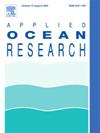Adaptive informative path planning for active reconstruction of spatio-temporal water pollution dispersion using Unmanned Surface Vehicles
IF 4.3
2区 工程技术
Q1 ENGINEERING, OCEAN
引用次数: 0
Abstract
Real-time pollution monitoring is critical for marine environmental management, where accurate tracking and reconstruction of pollutant dispersion are essential to mitigate ecological impacts. This paper introduces an adaptive informative path planning (IPP) framework designed to address the challenges of reconstructing spatio-temporally varying dynamic environments, focusing on pollutant dispersion in marine environments. The framework combines a Finite Element Analysis (FEA)-based pollutant dispersion model with a recursive Bayesian estimator to capture spatio-temporal dynamics in complex marine environments accurately. Two information-based utility functions are developed to quantify and reduce system state uncertainty, enabling more effective and targeted data collection by Unmanned Surface Vehicles (USVs). Monte Carlo Tree Search (MCTS)-based path planning strategies are employed in the proposed framework with thorough comparative studies against the myopic path planning methods. The proposed framework is rigorously evaluated across three scenarios, investigating its performance under different starting positions and pollutant source terms. The testing scenarios, which reflects real-world conditions such as oil spills and chemical leaks, help assess the robustness and adaptability of the framework. A sensitivity analysis is conducted to guide the fine tuning of the path planning strategy. Comparative studies highlight the superior performance of the proposed framework, with the combination of expected information gain (EIG)-based utility and MCTS consistently achieving the lowest reconstruction error and demonstrating enhanced robustness in dynamic and uncertain environments. These results establish the framework as a significant advancement in autonomous environmental monitoring, offering a new solution for dynamic pollution tracking and management.
求助全文
约1分钟内获得全文
求助全文
来源期刊

Applied Ocean Research
地学-工程:大洋
CiteScore
8.70
自引率
7.00%
发文量
316
审稿时长
59 days
期刊介绍:
The aim of Applied Ocean Research is to encourage the submission of papers that advance the state of knowledge in a range of topics relevant to ocean engineering.
 求助内容:
求助内容: 应助结果提醒方式:
应助结果提醒方式:


